#disco demolition
Text
A: Hank, if Exterminator! by Burroughs came out in 1973, Nashville by Altman in 1975, and Looking for Mr. Goodbar in 1977, would you have wanted to be in the 70s
D: duhhhh i've been saying the 70s was the best decade for ages now. it had to be destroyed because it was high energy, danceable, urban, black, gay, weird, punk, drug-using --
Stay Puft HATES those 8 things
Stay Puft will crush you for being
1 ) high energy
2 ) danceable
3 ) urban
4 ) black
5 ) gay
6 ) weird
7 ) punk
8 ) drug-using
prob many other reasons Stay Puft had to crush it, but I don't want to get into it all right now.
I'm so sick of conservatives talking about the end of civilisation. The end of good music, agreed -- but I mean, look how people were behaving in America in 1979. Naughty, naughty..
youtube
youtube
#the 70s#1970s#william s. burroughs#robert altman#richard brooks#looking for mr. goodbar#looking for mister goodbar#donna summer#punk#disco demolition#disco demolition night#ghosbusters#stay puft#stay puft marshmallow man#Youtube
3 notes
·
View notes
Text
[Tues June 27] HK street racing and the QAnon Queen of Canada
Here’s the recap from today’s Twitch stream:
First up, Hong Kong’s street racing underworld. Mihir has been following this for a few years now, and he talked about meeting a guy who later ended up dying after crashing his car.
Then, Mack came through to talk about finally meeting the QAnon Queen of Canada outside her motorhome (sorta).
which made us think about this one:
and for VICE Book Club, here’s your assignment:
youtube
or this
see you next time!
0 notes
Text
On The Jukebox: Olly Murs - “Remixes 2″
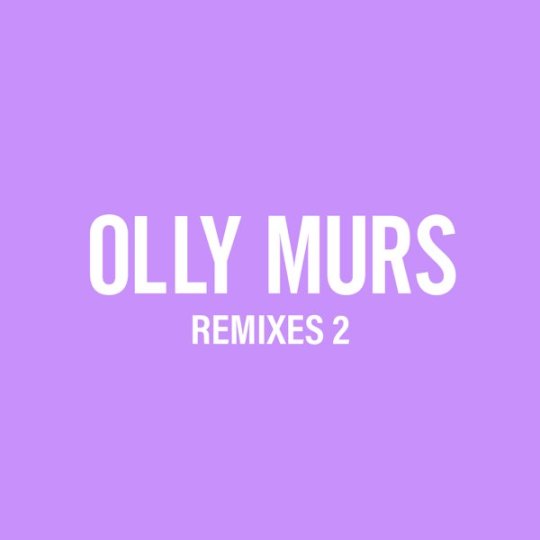
[And here’s part two. Track listing as follows:
“Up (Max Sanna & Steve Pitron Radio Mix) (featuring Demi Lovato)”
“Up (Wideboys Radio Mix) (featuring Demi Lovato)”
“Seasons (Seamus Haji Radio Mix)”
“Seasons (Adam Turner Radio Mix)”
“Unpredictable (Duet Version) (Disco Demolition Remix) (featuring Louisa Johnson)”
“Unpredictable (Duet Version) (Disco Demolition Edit Remix) (featuring Louisa Johnson)”
“That Girl (CORSAK Remix) (featuring Liu Yu Ning)”]
#olly murs#remixes 2#demi lovato#louisa johnson#liu yu ning#max sanna#steve pitron#wideboys#seamus haji#adam turner#disco demolition#corsak
1 note
·
View note
Text
The Day Disco Died: Remembering the Unbridled Chaos of "Disco Demolition Night"
The Day Disco Died: Remembering the Unbridled Chaos of “Disco Demolition Night”
(via edm.com) by MIKALA LUGEN
On this day in 1979, a fun MLB promotional event quickly devolved into the most infamous and controversial event in disco history.
In the late 70s, dance-oriented disco was one of the most popular musical genres in the United States. Seminal films such as Saturday Night Fever and Disco Godfather greatly influenced the music scene, while artists like the Bee Gees,…

View On WordPress
0 notes
Text
youtube
When I was a child in the '80s, I absorbed some kind of cultural truism that disco was ridiculous, embarrassing, cheesy, a cultural relic to be mocked at every turn. Remember, I'm under ten years old at this time, and I still manage to get this impression. There was another, milder sea change when grunge overtook the hair metal of the late '80s, so I never questioned the idea that disco should be dead and buried. We like silly things, I thought in my 13-year-old wisdom, and then we get over it.
Then I saw The Last Days of Disco (1998) while I was in college, and suddenly I realized that disco was fun, and it was like—it was in the roots of—music I already loved. And the end of that movie also—hints? tells you? I can't remember how explicitly—that disco didn't just fade like most trends; it was killed off.
I watched a lot of VH1 in those days, the late '90s, with a little TV sitting on my tall university-issue dresser, its corner overlooking my computer desk while I struggled with piles of assignments. This was the heyday of Behind the Music, so it was great background TV. And then one day (1999) they ran a Donna Summer—the "Queen of Disco"—concert special. The video up there is the song that immediately became my favorite of hers. It’s just instant serotonin to me, any version of it. I bought the whole VH1 album on CD, and "This Time I Know It's For Real" may genuinely be one of my all-time favorite songs, now, still, more than 20 years later. You can hear the original version (1989) here (the backing instrumental that I just found today is lovely), but the live version ten years later, the video up there, has a really special comeback—joyous, gracious survival—energy to it.
Watching the whole concert, I got it. Why the fuck did I ever think disco wasn't amazing? It was always the kind of thing I loved; we had all just been pretending that it was embarrassing glitter trash.
And then I found out why we were pretending. From densely-footnoted Wikipedia:
Disco Demolition Night was a Major League Baseball (MLB) promotion on Thursday, July 12, 1979, at Comiskey Park in Chicago, Illinois, that ended in a riot. At the climax of the event, a crate filled with disco records was blown up on the field between games of the twi-night doubleheader between the Chicago White Sox and the Detroit Tigers. Many had come to see the explosion rather than the games and rushed onto the field after the detonation. The playing field was so damaged by the explosion and by the rioters that the White Sox were required to forfeit the second game to the Tigers.
[...]
The popularity of disco declined significantly in late 1979 and 1980. Many disco artists carried on, but record companies began labeling their recordings as dance music. [...] Rolling Stone critic Dave Marsh described Disco Demolition Night as "your most paranoid fantasy about where the ethnic cleansing of the rock radio could ultimately lead". Marsh was one who, at the time, deemed the event an expression of bigotry, writing in a year-end 1979 feature that "white males, eighteen to thirty-four are the most likely to see disco as the product of homosexuals, blacks, and Latins, and therefore they're the most likely to respond to appeals to wipe out such threats to their security. It goes almost without saying that such appeals are racist and sexist, but broadcasting has never been an especially civil-libertarian medium."
Nile Rodgers, producer and guitarist for the disco-era band Chic,
(who survived the disco era to make half the music I loved in the '80s)
likened the event to Nazi book burning. Gloria Gaynor, who had a huge disco hit with "I Will Survive," stated, "I've always believed it was an economic decision—an idea created by someone whose economic bottom line was being adversely affected by the popularity of disco music. So they got a mob mentality going."
The DJ who ran the whole thing, Steve Dahl, complains that it was VH1 itself—you know, those Behind the Music specials I was watching—circa 1996 that labeled the whole debacle as bigotry when it so totally was not, you guys, and he is so tired of defending himself. But I'm gonna tell you, Steve, I don't really care. Maybe Disco Demolition Night was your fault; maybe you were just a part of something so much bigger and uglier that you couldn't see the whole size of it. Can you draw a direct line from the weird bigoted vitriol directed at those dance records to Ronald Reagan, elected the very next year, not giving a single fuck about the AIDS crisis? You probably don't want to, but I will.
And I don't care because I can look around the U.S. right now and tell you, nearly 45 years later, people are trying to demolish a lot more than disco. The Club Q shooter was sentenced to life in prison just a few hours ago. It's Pride Month, and we're all sitting here holding our breaths. That's a terrible way to end a post about a beautiful happy song I love, I guess, unless you turn it around and say, that should have been the whole point of this post in the first place. Listen to this song and think, people wanted to destroy this music, this sound, this joy for some reason. They want to stop people from just living their lives, from dancing. And yet, disco is still here. It was there in 1979, and it was there when Donna Summer released this song in 1989, and it was there when she returned in 1999. The Queen of Disco passed away in 2012, and it's still here. I feel a lot of joy when I listen to this song, but I don't think I'd ever thought about it being the joy of grooving with something just because it’s beautiful, the joy of just being here, still.
#donna summer#music#video#disco demolition night#queer history#lgbtqia+#club q shooting#aids crisis#pride#pride for one thousand years#I feel really hesitant about the turn this post took but#if the dots are there you gotta connect them#long post#music discussion
208 notes
·
View notes
Text
Y’all think Disco Demolition Night happened in the Ninjago universe? Y’all think Lego Steve Dahl got fired from his Lego disk jockey job and blew up Lego disco music in Lego Comiskey park? Do you guys think Wu and Garmadon would have attended Disco Demolition Night?
#sorry guys I’m thinking about Disco Demolition Night again#ninjago#lego ninjago#mason talks#mason posts
13 notes
·
View notes
Text
Did you know that, in the late 70's, there was a violent rally held by angry rock fans in which they blew up disco records to "kill the disco movement" in response to it's place in both gay liberation and afro/latino empowerment plus their belief that it was destroying rock and roll?
Discotheque originated in french nightclubs in the twenties, thirties, and fourties. However, it was the mid seventies that brought about a strong American take on the genre. Disco was growing in the underground club, bar, and punk scene. Featuring rhythmic drums and african influenced beats, it was rapidly gaining popularity in the dance scene and massively outselling rock and roll. Rockers felt that switching up musically to sell better was synonymous with selling out. Plus why would they bother? They said that disco was a mindless fad compared to their superior lyrical work and sound.
For a few years the conflict of genre built tensions. Producers wanted more and more disco funk. Bringing about an age of gay liberation and putting black and brown artists in the spotlight, featuring openly queer black artists like Sylvester and Martha wash. Rock was being called on much less. It all came to a head in July of 1979.
youtube
"Disco Demolition Night" took place at Chicago's Comiskey Park between baseball games on July 12, 1979. It was organized by radio host and dj Steve Dahl. Calling for the death of disco, the end of the "musical disease." Dahl claims it was nothing but a harmless stunt; continuously denying its racist and homophobic nature.
The day after the event Dahl hosted his usual morning broadcast. He began by reading the headlines reporting the previous night's events, mocking the coverage, saying, "I think for the most part everything was wonderful. Some maniac cohos got wild, went down on the field. which you shouldn't have done. Bad little cohos"*
To my understanding Steve Dahl never renounced his feelings towards disco nor has he shown any remorse for his actions. Seeing as he still sells merchandise featuring the event on his website. Including hats and tshirts commemorating the night of 7-12-79.
Rolling Stone Critic Dave Marsh attended the event and wrote at the time, "Your most paranoid fantasy about where the ethnic cleansing of the rock radio could ultimately lead... white males 18 to 34 are the most likely to see disco as the product of homosexuals, black and latins, and therefore they're the most likely to respond to appeals to wipe out such threats to their security."
Fans rushed the field brandishing tshirts and banners stating "Disco Sucks." A notable phrase used in connection to the movement to kill disco. Still heard in passing to this day. The phrase may seem harmless today noting that we use "sucks" so casually. It is worth noting that at the time it was new slang; directly and intentionally homophobic. It is often forgotten exactly what we're accusing the subject of sucking.
The effects of Demolition Night swiftly radiated out into the media production circuit. Sending Disco back underground to the safe havens of queer clubs and bars, like the loft and stonewall, as well as the subterranean punk spaces of their origin.
Today it's commonly believed that disco's popularity did die in 1979. Producers, studios, and clubs started rebranding the genre as "dance" music. Even pioneers of disco became disillusioned with the genre noting that media producers had oversaturated disco sound, wringing out any cultural significance it had at the start. Making way for hip-hop, pop, and punk.
However, dancing to the selections of DJs had integrated into culture in major urban centers. As an activity it wasn't going anywhere. With the inability to capitalize on it the culture discovered a new lease of life, free of the labeling and profiteering. Disco may have been dead, but its influence was alive and well.
To learn more:
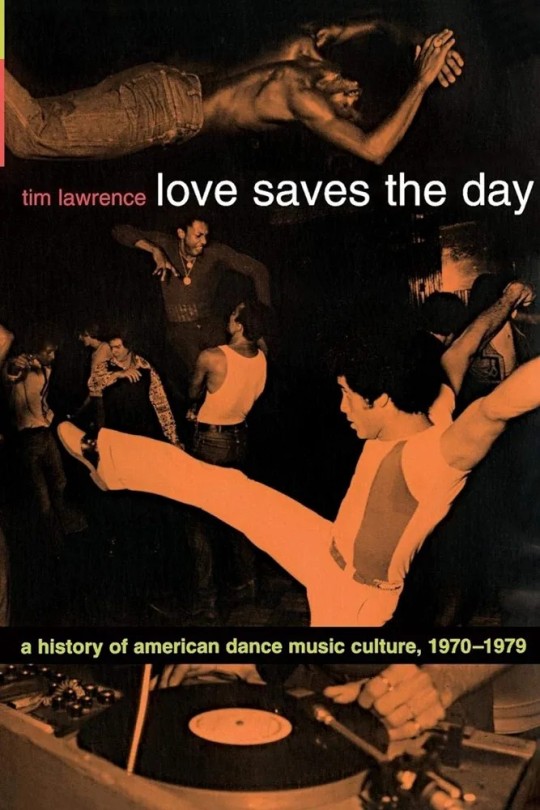
A more extensive account of the culture and history can be found in this book "Love Saves the Day" by Tim Lawrence.
I also recommend this playlist curated by the Woody Guthrie memorial museum in Tulsa, Oklahoma during their exhibit of the same name earlier this summer. Exploring the history and sound of disco.
TL;DR - Disco was major to gay and poc empowerment. Then a bunch of people rioted and blew up disco records at a baseball game leading to the decline of Disco's popularity in mainstream media.
*Coho - noun; a person or thing that shows the existence or direction of a trend - (another definition is a kind of salmon but i have the feeling that would be inaccurate as funny as it may be)
#long post#multimedia essay#disco wasn't profitable anymore but it was free to grow on its own#in that way i feel that a lot of us on Tumblr can appreciate it#it's just something i want more people to know about#disco#disco Demolition Night#rock and roll#rock#punk#gay liberation#poc#latino#queer culture#stonewall#Spotify
15 notes
·
View notes
Text
“We Rock ‘n’ Rollers Will Resist—And We Will Triumph!
When the Smoke Cleared on Disco Demolition Night, Debate Over Its Cultural Meaning Began.
— October 26, 2023 | Kirstin Butler
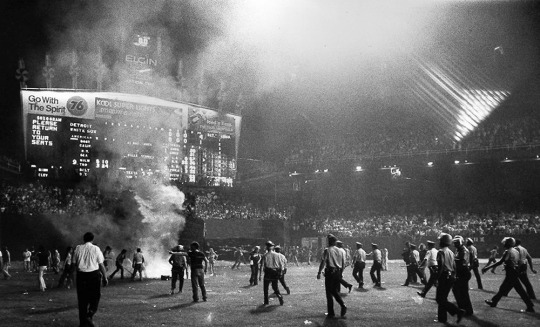
Courtesy Chicago Sun-Times. Photo by Jack Lenahan
In the bright glare of Comiskey Park’s stadium lights, the rising column of smoke takes on a spectral quality. Riot police approach from the right to close in on the phantom, a smoldering pile of vinyl records, at center field. Debris litters the turf below; haze obscures the deck above. Disco Demolition Night, as captured here by a Chicago Sun-Times staff reporter, had turned into something far more out-of-control than a promotional stunt during a double header.
The July 12, 1979 event was the brainchild of a Chicago shock-jock-style radio personality, 24-year-old Steve Dahl, and Mike Veeck, Chicago White Sox promotions manager and son of the baseball club’s owner. Dahl had become a self-appointed anti-disco activist the previous Christmas Eve when he lost his job; his then-employer had switched overnight from rock to an all-disco playlist, following a nationwide trend that saw many radio stations jump on the disco hype train.
Dahl landed at WLUP 97.9, another rock station, where he developed a loyal following. He opened each morning’s broadcast with a ritual: According to a 2019 interview with NPR, Dahl would first cue up a disco song, and then after a harsh record scratch, play the sound of an explosion. He began hosting “Death to Disco” rallies at local Chicago nightclubs, and his band, Teenage Radiation, recorded a disco parody track (sample lyric: “Look at my hair, it's perfect/I saw Saturday Night Fever/Eighty-seven times”). “We have to destroy all disco, it’s our job,” Dahl told his listeners. He planned to make good on his destructive mission, literally, by blowing up a cache of disco records at a local mall. When Veeck learned of the idea, he offered Dahl a much larger venue for the pyrotechnics. The event would take place on one of Comiskey Park’s teen nights.
Dahl was tapping into an animus that had as much to do with anxiety over the zeitgeist as dislike of a musical genre. “It’s worth remembering now that in 1979, the economy and economic opportunities for people who don’t have a college education is actually shrinking,” Adam Green, a professor of African American history and cultural studies at the University of Chicago, told American Experience. “The city is changing because of things that have to do with the economy and politics; it’s not changing because of disco music. But if Steve Dahl says that he’s been screwed by disco, it gives permission to other people to say, ‘you know what? I’ve been screwed too.’”
youtube
Steve Dahl’s band recorded an anti-disco parody of Rod Stewart’s “Do Ya Think I’m Sexy.”
Disco had first emerged earlier in the decade, evolving out of funk, R&B and soul music; its innovators were Black, gay and Latino, and its milieu was the underground nightclub, where those marginalized groups found safe spaces to socialize. However, once record labels realized the genre’s commercial potential, disco music went mass market. And those now-mainstream clubs where disco was played (of which Studio 54 in New York City was the ne plus ultra) developed an elitist cachet that alienated the young, mostly white working class Chicagoans who listened to Dahl. With songs like “Y.M.C.A.,” “Night Fever” and “I Will Survive” topping the Billboard charts, the genre’s ascendance by the end of the Seventies was complete. It was also, then, a prime target for takedown.
These currents were all swirling in the air around the nighttime double header in mid-July, a showdown between the last-in-league Chicago White Sox and the Detroit Tigers. Veeck simply thought Disco Demolition Night would draw several thousand more fans during a losing season.
Dahl wore a combat helmet and fatigues to the park. His anti-disco army turned out en masse, drinking and growing increasingly rowdy as the innings went on. By the time Dahl rode out onto the field in a military Jeep after the first game, nearly 50,000 spectators were crammed into the park; an additional 10,000-plus were outside.
For reduced-price tickets to the park that night, many attendees brought records to be destroyed; all of the sacrificial vinyl filled a bin that was set down, ceremonially, in the middle of the field. Dahl got the crowd chanting “Disco Sucks,” a message matched by homemade banners hung from the stadium’s upper deck. “They’re not gonna shove it down our throats,” he yelled into a microphone. “We rock ‘n’ rollers will resist—and we will triumph!” The records were detonated, tearing a crater into the midfield sod. “That blowed up real good,” Dahl crowed, echoing the signature line that accompanied his on-air disco “explosions.” Triumphant, he got back in the Jeep and rode off the field—along with many of the ballpark security staff. That was when the true mayhem broke out.
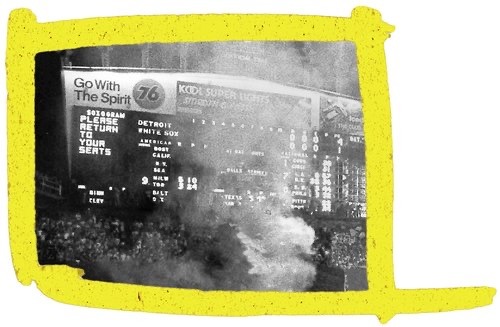
People started streaming onto the green by the thousands. They stole bases and tipped over a batting cage; they ripped up turf. They rushed both bullpens and began burning signs. Fights broke out. Veteran White Sox announcer Harry Caray tried to shift the tone by singing ‘Take Me Out to the Ballgame’ over the PA system. No one listened. A message on the scoreboard—PLEASE RETURN TO YOUR SEATS—pleaded, futilely, with the attendees still stoking fires. White Sox announcer Jimmy Piersall opined, “I hope they don’t let you people see what’s going on here at Comiskey Park; one of the saddest sights I’ve ever seen in a ballpark in my life.” Eventually the Chicago riot police arrived, some on horseback, and cleared the field.
Later, after the smoke cleared, and critics and commentators began evaluating the event, many would describe Disco Demolition as an opening salvo in the culture wars. What role racism and homophobia played in Dahl and his groupies’ rebellion remained up for debate. Even from today’s vantage point, a definitive interpretation of Disco Demolition is still murky. “If we seek a true memory,” Green said, “this is the meaning of the backlash against disco, then we're probably going to find ourselves in a situation where we never settle the argument. And I think that that’s the way of all major cultural transformations.”
#Youtube#American Experience#NOVA | PBS#Kirstin Butler#Rock ‘n’ Rollers#Triumph#Steve Dahl#Disco Demolition Night#Debate Over Cultural Meaning
2 notes
·
View notes
Text
Love this article, and reading it more thoroughly for the second time since there's always people out there who are going on about this as the greatest night ever.
Nobody in America ever turns on their brains.
I realise just from watching Bruce and Christina what pleasure a cucked homo, even, gets from trying to stamp out queers it sees as beneath itself. If you think the USA as a whole doesn't get massive pleasure from the chance to beat down blacks and queeres, you're making a huge mistake about what we are as a nation.
Are there some good people in the USA? Sure, but we're not out of the plantation masters' woods of the past yet -- not even close to it.
1 note
·
View note
Text
I LOVE HAVING BLORBO THOUGHTS ABOUT SONGS!!!!!!!! I LOVE MAKING IMPOSSIBLY INTRICATE CONNECTIONS W MY FAV CHARACTERS AND LYRICS
#please does anyone want to hear about my emo music connections to various kuro ships ple#theyre all angst btw#we have redcliff as Love From The Other Side by Fall Out Boy#we have Grelliam (or SebaGrelle) as She Had The World by Panic! at the Disco#AND WE HAVE SLINGPHRIES AS DEMOLITION LOVERS. I LOVE DEMO LOVERS SHIPS
5 notes
·
View notes
Text
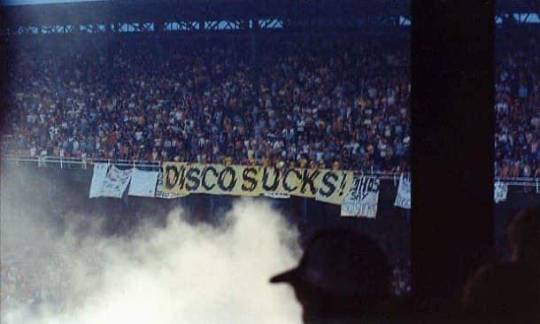
July 12, 1979
43 years ago today the Chicago White Sox baseball team held a “Disco Demolition Night” in between games of a double header. The team had hoped to attract 25,000 fans to the game by offering 99 cent admission to anyone who showed up with a disco record that would be destroyed in an on the field “celebration” in between games. Over 50,000 fans showed up and after the records were blown up thousands of fans raced onto the field. Ultimately the White Sox had to forfeit the second game as they were unable to gain back control of the field. Some people like to say that this is the evening that disco died in the 70s.
3 notes
·
View notes
Text
[carteBlanche] - dance ! (SoloEdits)
1 note
·
View note
Text
sometimes i think about how disco music was trashed, hated, reviled, and lobbied against in the 70's, even yielding the famous "disco demolition night" where people just showed up to a sports stadium and destroyed disco records. i think about how it was a genre that was pioneered, dominated by, and celebrated by the black community in america, especially the queer members. so much hatred, so much pushback. i even just watched the 2022 minions movie and one of the punchlines was torturing someone by making them listen to disco constantly. it's that stigmatized yeah.
and then daft punk, two cishet white boys, make a disco record "random access memories" and it becomes one of the best selling albums of all time. idk how fair it all is.
9K notes
·
View notes
Text
I can’t believe Disco Demolition Night was a real thing that happened and everyone just says that disco music died.
Disco did not die, they KILLED IT. They BLEW IT UP in a big dumpster July 12, 1979 :(
#number one disco defender for life#:(#i miss disco#disco#mason talks#mason posts#disco demolition night
14 notes
·
View notes
Note
My hcs for you are that you’re a time traveler from the late 70s trying to bring disco back.
Also your username is a lie you actullay play scout/j (I don’t know if you play tf2)
SHIT I'VE BEEN FOUND OUT
you found out the truth, I'm from August 1979 and I couldn't live life after Disco Demolition Night, so I snuck into a government facility and stole their only working time machine to come to the present 😔/j
also I used to play tf2, my mains were medic and pyro 😎👍
#pyro got a letter#mutuals moment#honestly though disco demolition night was insane :C#kinda fucked up when you read about it#but to make a SUPER long story short#a rock record jockey teamed up with chicago game organizers to let people with disco records into the white sox game for less than a dollar#the night ended in all those records being blown up on the field and a riot broke out and the white sox had to forfeit the game#theres a lot more that went into it but that's basically the long and short of it lol
1 note
·
View note
